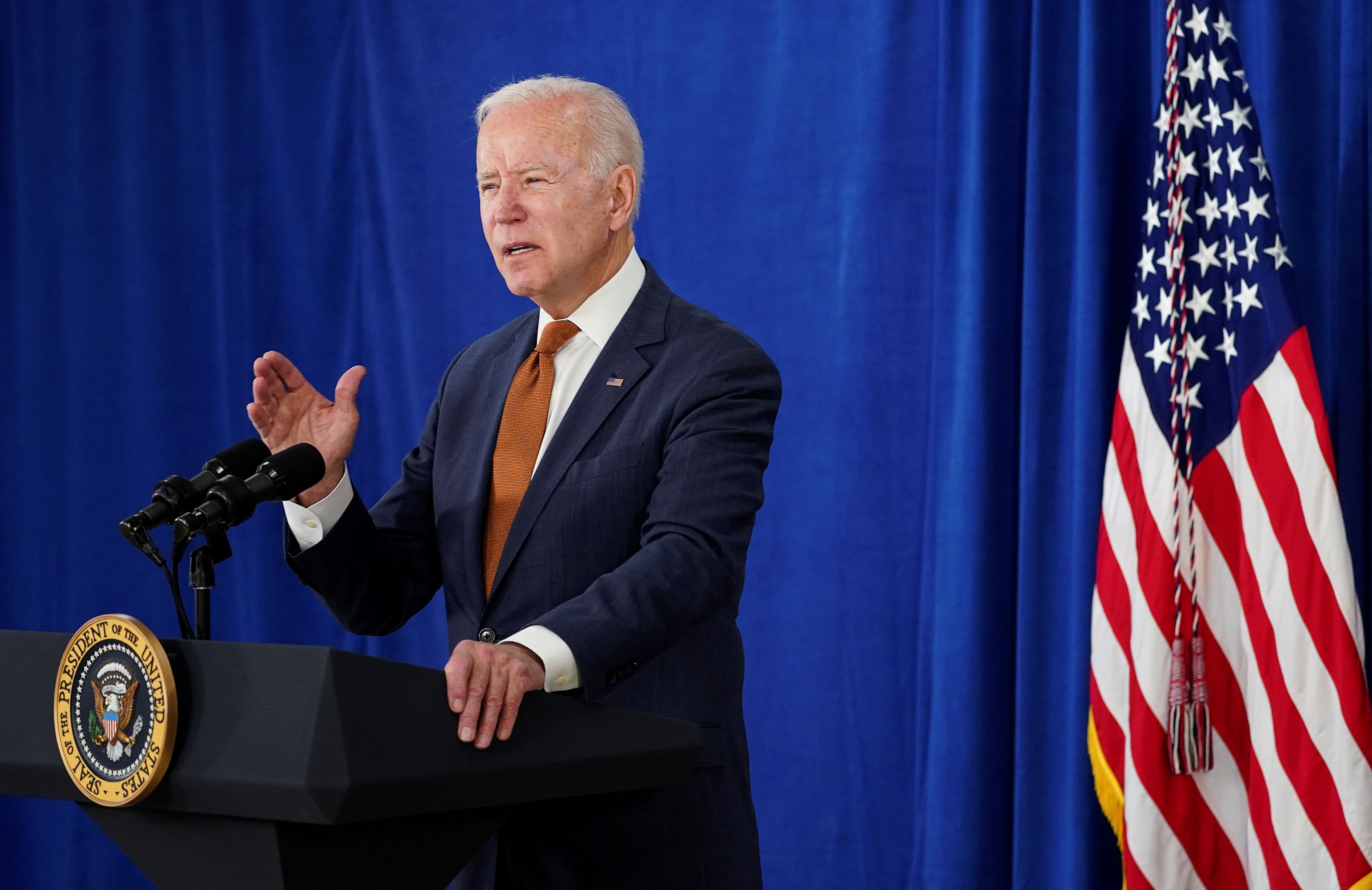Democrats trim Biden's social spending plan as they rush to strike a deal this week
As President Joe Biden and Democrats slash the cost of their budget bill to win over key senators, major programs are being scaled back.

U.S. President Joe Biden delivers remarks on his Build Back Better infrastructure agenda at the NJ TRANSIT Meadowlands Maintenance Complex in Kearny, New Jersey, U.S., October 25, 2021.
Jonathan Ernst | Reuters
WASHINGTON – As President Joe Biden prepares to depart on Thursday for a week of summits in Europe, the White House and congressional Democrats are scrambling to finalize a deal on their signature domestic spending package.
If they can accomplish this, House Speaker Nancy Pelosi plans to bring a companion bipartisan infrastructure bill to the House floor for a vote before the president leaves for Rome. That bill has already been passed in the Senate. If it is approved in the House, Biden could sign it into law this week.
Biden visited New Jersey on Monday to promote the infrastructure piece of his two-part plan.
"This is going to be good union jobs for a prevailing wage that you can raise a family on, jobs that can't be outsourced," he said of the bill's rail and transportation funding. "We'll make the largest investment in public transportation in the history of America."
Until Democrats can agree on the terms of the social safety net expansion bill, progressives in the House will not approve the infrastructure bill.
But in the Senate, two centrist Democrats — Joe Manchin of West Virginia and Kyrsten Sinema of Arizona — are refusing to endorse the spending plan until their specific demands are met.
In order to satisfy Manchin, the topline cost of the spending bill is being slashed from $3.5 trillion to between $1.5 and $2 trillion. To win over Sinema, Democrats must rework their original plan to tax the highest earners and corporations to pay for the safety net expansion.
Tough choices
Democrats are making some difficult decisions to bring the plan's over price tag down. Several of Biden's campaign promises have been abandoned altogether, like providing free community college and instituting a clean electricity standard with penalties for utilities that don't comply.
Other programs that were initially going to be permanent will instead expire in a year or two, such as the expanded Child Tax Credit and expanded Medicaid.
Still, more plans were on a knife's edge Monday, such as a plan to expand Medicare to include hearing, vision and dental care coverage. This plan is popular with voters and with members of Congress, but it's also expensive, projected to cost around $350 billion over a decade.
Over the weekend, Pelosi acknowledged that Democrats are considering whether to cleave off the most expensive of the three Medicare services, dental care, in order to cut the cost. "Dental is very expensive," she told CNN.
The Medicare question was further complicated Monday afternoon by reports that Manchin does not support any expansion of the program.
Another provision being reworked was paid family leave, a hallmark piece of Biden's pledge that his bill would ease the financial burden on working families. Democrats initially wanted 12 weeks of guaranteed paid family and medical leave for every U.S. worker, a benefit that was projected to cost nearly $500 billion over a decade.
As negotiations have progressed, however, that plan has been scaled back. As of late last week, the White House was working on a plan to provide 4 weeks of paid leave to low-income workers, who are more likely to work in jobs that don't offer paid leave.
But this too has encountered late-stage opposition from Manchin, NBC News reported Monday, citing multiple sources.
As negotiations have dragged on and grown increasingly tense, the White House and Democratic leaders in Congress have worked hard to keep their caucus focused on a common goal, and to prevent inter-party policy disagreements from becoming public fights.
On Sunday, Biden hosted Manchin and Senate Majority Leader Chuck Schumer for breakfast at his house in Delaware. It's rare for presidents to host individual members of Congress for a meal, let alone one on a Sunday at the president's private residence. The meeting underscored Manchin's pivotal role in the outcome of this week's talks.
As for what the negotiators might achieve this week, Manchin said he believed there would be a "conceptual framework" by the end of the week.
Whether a "conceptual framework" of social spending is enough to satisfy House progressives is a big, unanswered question.
House progressives have already blocked two scheduled votes on the bipartisan infrastructure bill.
The tax scramble
Costs aren't the only part of the bill that were still up in the air Monday, however. Paying for the bill was also a question mark, especially after Sinema of Arizona said last week that she opposed two pillars of the Democrats plan until now: an increase in the corporate tax rate to 25 or 26% and a return to the pre-Trump top individual tax rate of 35%.
Without these revenue raisers, Democrats are being forced to go farther afield in search of money to pay for their plans.
A growing number are warming up to the idea of a "billionaire's tax," a special tax on the 800 or so wealthiest Americans.
Not long ago, this kind of laser focus on taxing billionaires was embraced only by the party's far left flank.
"We probably will have a wealth tax," Pelosi said on CNN. "But, again, it's only 10% of what we need" to pay for the plan.
Other proposals include stepped up IRS enforcement that would include giving the tax agency access to records for bank accounts that receive $10,000 or more in non-wage deposits.
Also on the table is a global minimum corporate tax rate, a plan that has gained support this year among developed nations, but which is still very much in its early stages.
--- CNBC's Kevin Breuninger contributed reporting from Keany, N.J.

 Aliver
Aliver 





















![Run An Ecommerce SEO Audit in 4 Stages [+ Free Workbook]](https://api.backlinko.com/app/uploads/2025/06/ecommerce-seo-audit-featured-image.png)










